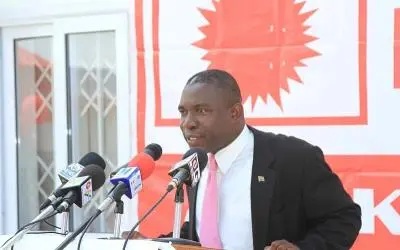Albert K. Salia
Politics
3 minutes read
A Management Consultant, William Dowokpor, has called for a national debate on political party financing to address the problem of individuals taking over political parties.
He warned that if the problem was not appropriately addressed, the increasing monetisation of politics would become a typical example of “polipreneurship” or managing a political party as a profit-making venture.
Such a practice, if not nipped in the bud, he said, would constitute a powerful, irresistible negative force of influence, easily transferred and or imposed at the inter-party and national levels.
That, he said, would result in politicians pushing for extension of presidential term limits or promoting corrupt deals to enable them to recoup their investments.
Context
A former Speaker of Parliament, Professor Mike Aaron Oquaye, recently described as exorbitant and “a bbonic plague” the GH¢4 million demanded by the New Patriotic Party (NPP) from aspiring flag bearers.
He said the election was not an auction and the political party could not be for sale, stressing that “Moneycracy is not democracy and a political party must not be seen pursuing that pathway”.
A 2018 report by the Westminster Foundation for Democracy (WFD) and the Ghana Centre for Democratic Development (CDD-Ghana), indicated that the cost of running for office as a Member of Parliament (MP) increased by 59 per cent between 2012 and 2016.
Many scholars argue that the high fees put the wealthy ahead of talent and expertise.
There have been concerns about the influence of money in politics in the country, not only in the selection of candidates for political parties, but also in national elections.
Reacting to some of those concerns, Mr Dowokpor stated that such high financial demands excluded the otherwise qualified candidates because of “economic status.”
That, he said, infringed on the letter and spirit of article 17(2) of the 1992 Constitution.
“It also offends article 55(5) of the Constitution 1992, which enjoins political parties to conduct their internal affairs in a manner consistent with democratic principles and the Constitution,” he stressed.
Mr Dowokpor noted that the stated reasons for imposition of the development fee, whether on authority of the party’s rules or at the discretion of party officials, remained inconsistent with the whole of Article 296 of the 1992 Constitution.
Democracy
To attain the dividends of democracy, he stressed the need for the citizenry to insist on fidelity to the letter and spirit of the 1992 Constitution on all fronts, by strengthening intra-party democratic structures and practices.
“We must encourage gender balance, increased youth and women participation in the intra-party decision-making process and find a workable formula for state funding of political parties,” he said.
Mr Dowokpor noted that state funding of political parties was unpopular for obvious reasons.
“But that is the way to go, to cure the state capture by party financiers who pay themselves back in ways that consistently deny Ghana the massive resources needed for transformational development,” he stated.
